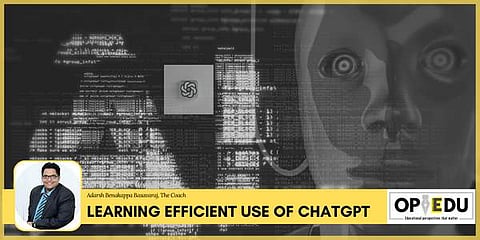

The whole world has gone bonkers about ChatGPT. It has not only unlocked unlimited possibilities but has also shown us that the future is quite exciting. I'm sure you've all heard enough about it so let me get to the crux of our conversation. We all know, "Too much is too bad," and today, I'd like to focus on HOW MUCH IS TOO MUCH. I loved the response I got when I asked the AI about how much to rely on it and the reply that I got is exactly the message I intend to pass on to all students. ChatGPT told me "Use me as a supplement to learn and not as a REPLACEMENT!" Well said!
Yes! It's a powerful tool and has already proven its worth, but it's also gotten a lot of people jittery as we're still yet to understand how such a big shift in technology is going to affect us. It's natural to feel so, especially when the founder of Open AI (The parent company of ChatGPT) Sam Altman himself said that he is "scared" of it and is confident that it will "replace" many jobs.
That said, here's what my take would be:
1. I agree with ChatGPT
Using ChatGPT as a supplement and not a replacement for learning is definitely the right thing to do, period. Using it to replace traditional methods like textbooks and lectures to an extent might be useful to a student's learning process as it helps the student to learn at his or her own pace. We've all faced this challenge of not being able to understand the lectures sometimes or even being unable to comprehend when we study the textbooks or other reading material, because of a variety of factors like the speed of the lecture, not being able to ask questions fearing what others might think or simply because we require more explanation to understand which might not happen in a classroom. Using this tool will definitely help address all these challenges and more.
2. The "human" factor
Irrespective of how evolved Artificial Intelligence (AI) gets, one thing it cannot replace is the human factor. Let me give you the best example that is easily relatable. If I used ChatGPT or any other AI to write my columns, you'd definitely get the required information, but you'll miss the personal touch for sure. Hence, if you rely too much on this tool, there is a very strong possibility that it might become mechanical and/or monotonous, leading to the outcome becoming too dry or purely technical, rather than having a connection with the author. This is just one example, but the base remains the same for almost every application as we can never teach an AI to feel but only empathise to a level and give calculated responses.
3. Use, don't abuse
One of the biggest drawbacks of becoming heavily reliant on AI or tools like ChatGPT is how it degrades our critical thinking ability. It is a skill very critical for us in all walks of life. If we become too dependent on the above-mentioned tools, it makes us lose the ability to independently research and check facts. Remember, that the earlier version (ChatGPT 3) had information only till 2021. This clearly illustrates that the information received from such tools is usually outdated and relying on it isn't conducive to learning.
Pro Tip: Set limits or specific conditions
Setting boundaries is crucial, be it on personal or professional fronts. Similarly, it'll help a great deal if we set boundaries on when to use ChatGPT. For example, limiting its usage to a specific time period a day (30 minutes is ideal), or using it only when you require a detailed explanation to understand a topic/concept, ensures that you stay productive and not get distracted.
The most important thing to note
In my recent clinical experience, I've come across a lot of individuals using ChatGPT as a companion and I'm worried that it's becoming addictive for introverts. Hence, I ask you not to turn to AI as a fix for human interactions. Go out, socialise, meet people, and work on becoming a better version of yourself rather than relying on better versions of the above-mentioned tools.
With love,
Adarsh Benakappa Basavaraj
Your Coach
